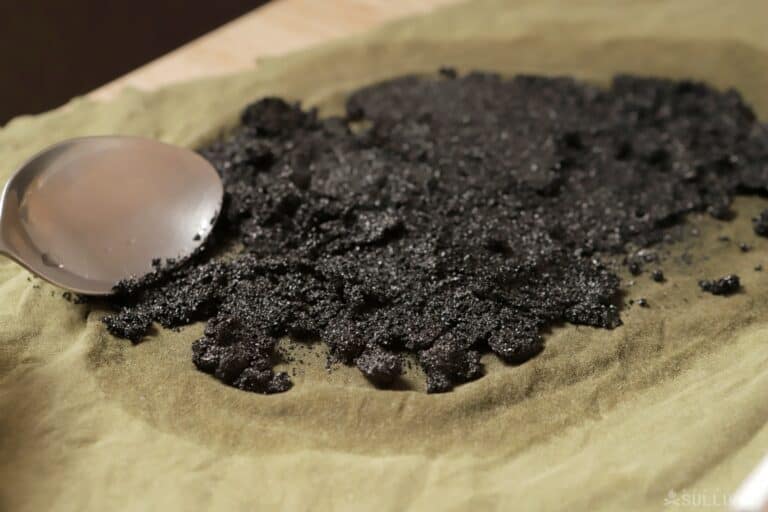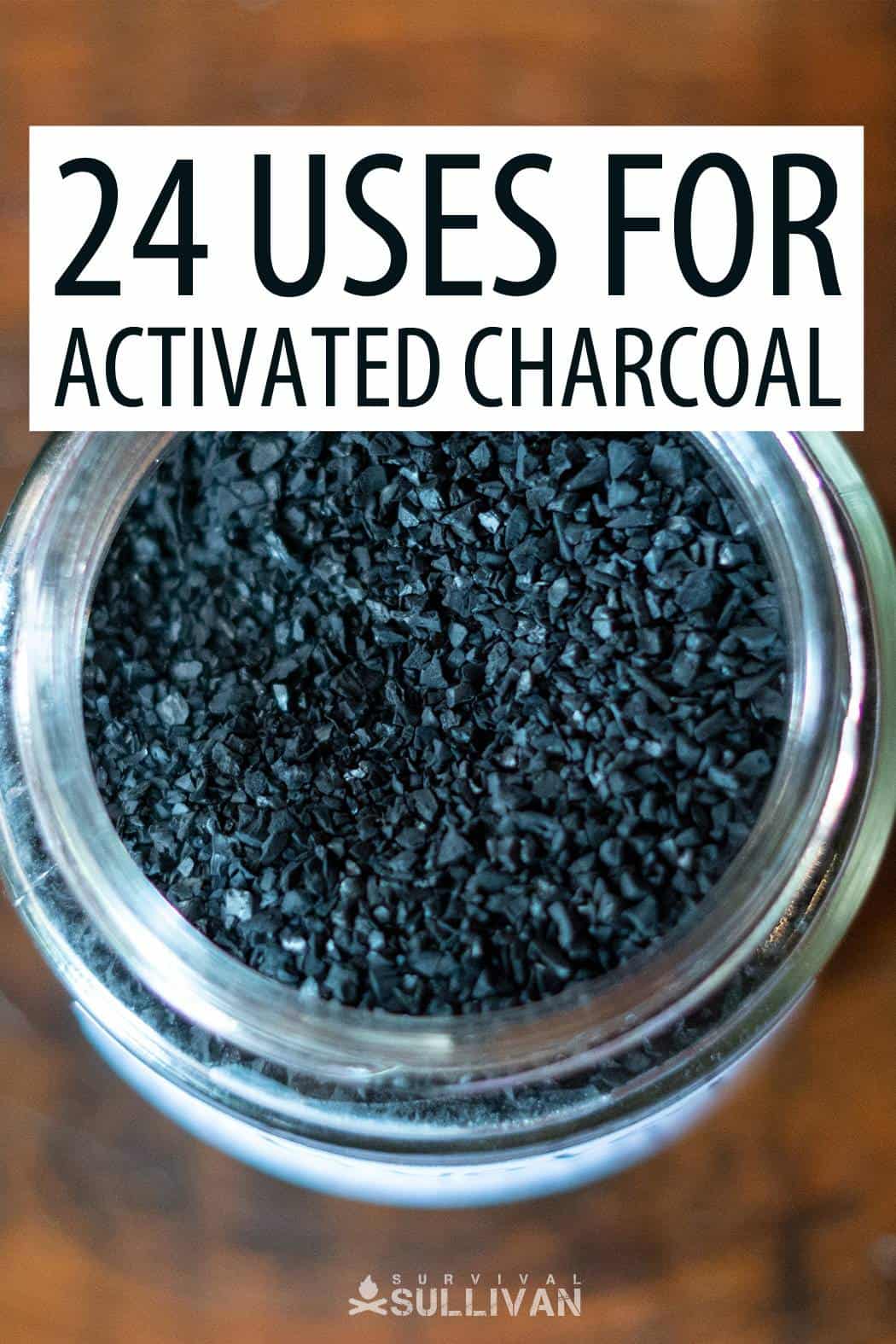Activated charcoal has a seriously wide number of uses, so it is worth discovering what makes it activated and how it differs from normal charcoal, because normal charcoal is just not the same.

When we are planning a campfire and prefer not to have the smokiness of wood, we may head off to buy a couple of bags of charcoal for the event.
Charcoal is produced by burning wood in a low oxygen environment and produces chunks of black, porous material once the water within the wood, and other volatiles such as the oil, burn off.
You may inadvertently create some charcoal when burning wood for a fire – especially if it is contained in a fire pit or a hole in the ground. Charcoal burns slower, retains heat better and gives rise to less smoke than wood.
So much for charcoal, but how does it become activated? And how does it differ from everyday charcoal?
Activated charcoal goes through another process in addition to the one wood went through to become charcoal.
To make activated charcoal, carbon rich material, for example wood or coconut husks, are heated to extremely high temperatures stripping the material of previously absorbed material, allowing the charcoal molecules to bond to other materials.
The addition of chloride salts also increases the surface area of the charcoal molecules. The process makes the activated charcoal, which is usually supplied in a powder form, adsorbent.
The difference between absorbent and adsorbent is that adsorbent material can bind to atoms, molecules and ions, removing these from the air or liquids.
It is for this reason a common myth arose claiming that activated charcoal gets rid of mold is often held. It doesn’t kill the mold spores but manages to hang onto them, thereby stopping the microscopic spores from floating around in the air, and getting into your lungs.
After this process, what you get is a fine black powder that has no odor. It can be bought as a powder, or formed into pellets or granules or even small briquettes, and is capable of adsorbing a large amount of material, in fact, one can compare it to the pores in a sponge – except you can’t squeeze out activated charcoal like you do a sponge.
If you want to reuse activated charcoal it would involve reheating it to around 1000 degrees Celsius, and depending what has been adsorbed by the charcoal could result in the release of toxins. Once it has been used rather dispose of it than trying to use a home appliance to reactivate it.
Making Activated Charcoal
Making your own activated charcoal a time consuming process and something you might want to do outside so you don’t have black powder everywhere. This video is for information in case you should need to know how activate charcoal.
Admittedly you can DIY it for less money, but the process and time it takes to make, is not justified versus buying it ready-made, as it is relatively inexpensive.
Where Is Activated Charcoal Used?
Here comes the list with all its amazing uses in products as diverse as toothpaste, skincare, and water filtration. Then it has numerous medicinal purposes from poisoning, to intestinal gas.
Water Filtration
A common usage for activated charcoal is in large and small water filtration systems where it can be used to adsorb impurities in the water such as various chemicals, and pesticides.
Apparently it can adsorb microplastics, bacteria, parasites, as well as lead, mercury and herbicides, while also bringing down chlorine levels.
Mold
When exposed to high levels of mold spores a person could suffer symptoms ranging from coughing, wheezing, and watering eyes, to rashes and headaches.
Often, the mold is hidden behind dry walls, under flooring, and within ventilation ducts, so sufferers may not even be aware that mold could be the cause, until home mold spore levels are checked by a professional.
Charcoal is effective in adsorbing the mold spores that float around in the air but it’s not going to be the final solution – the mold will keep producing if it not removed at the source.
Diarrhea
Many travelers to countries whose reputation for water purity may not be the best, take activated charcoal capsules should any member of their group get diarrhea. After all, one person sick on a trip can ruin the fun for everyone else.
The activated charcoal adsorbs the nasty bacteria and binds to them, removing them from circulating through the gut and are expelled with the charcoal.
Gas and Bloating
Certain foods are more likely to produce intestinal gas than others. Beans are a common culprit, however, taking a capsule of activated charcoal can help by adsorbing those by-products of the food eaten that during the digestion process cause the discomfort of gas, as shown in this study.
Poisoning
In the case of poisoning, emergency room doctors will give activated charcoal to adsorb to poisons. Speed is important, and it should be given within 30 to 60 minutes of the person ingesting the poison, before the poison gets from the gut into the bloodstream.
The treatment would depend on the type of poison.
This study mentions that in cases where it is not known exactly what type of poison was ingested that the amount of activated charcoal given should be a relatively large dose – they suggest between 50g to 100g for acute cases.
This is to make sure the activated charcoal is not saturated when adsorbing the poison.
It is often used in emergency rooms for treatment when a person has taken an overdose of sedatives, amphetamines or Acetaminophen, opium, cocaine, and morphine. The problem is that, the longer the time from ingestion to administering activated charcoal the less effective it is.
It can also help in the case of food poisoning, but it is best not to use as a home remedy in severe cases but rather get professional medical attention.
Alcohol Poisoning
Although a study has been done on the effect of alcohol ingestion on dogs and the effect of giving activated charcoal with good results, unfortunately it does not seem to have a significant effect on humans.
Apparently in humans the alcohol is absorbed quickly, making activated charcoal ineffective. However, it seems that if you are planning on consuming alcohol and want to limit your blood alcohol count then taking activated charcoal at the same time as you start drinking can result in a slightly lower count.
In the meantime, should the dog slurp up a whole lot of your favorite alcohol, then activated charcoal will help the animal.
Spirit Enhancer for Home Brewers
When distilling home brew, some people use activated charcoal to get rid of flavors, if they want to get a good finish on a pure spirit like vodka, made from a sugar wash. However, many distillers don’t like the use of activated charcoal as they say it removes the flavor from spirits like whiskey and rum.
Those people distilling spirits will take the hearts section of pure distilled alcohol, water it down to 50% alcohol by volume (ABV), then filter it using an activated charcoal filter which sweetens the product by removing certain toxins (aldehydes etc.) from the finished product.
Note you can’t use charcoal, but only activated charcoal, for the above. Those who use it as a spirit enhancer say it removes impurities from the distillate in fermenting to give a cleaner tasting, smoother spirit.
Odor Remover
When you want to get rid of smells in a cupboard or a fridge, a small container left open with some activated charcoal powder or granules will neutralise odors – just be careful because the fine black powder can get messy if spilt. Perhaps use the granules.
The ancient Egyptians used charcoal to remove odors from wounds, so the knowledge of its effectiveness as an odor remover has been around for millennia.
Body Odor
Activated charcoal has been shown to be effective in tackling body odor – it stands to reason that the bacteria surviving on sweat giving rise to body odor would be adsorbed by the activated charcoal.
It is a bit of a messy substance to deal with, and after using it mixed with a little water to form a paste, it needs to be thoroughly washed off – baking soda and warm water are effective.
Insect Bites
The toxins from the insect bite that cause pain and itching, can be alleviated by applying activated charcoal externally and administering internally to help adsorb those toxins, providing some relief.
In the case of bites by very poisonous insects it is advisable to get to a hospital as soon as possible.
Poison Ivy / Oak
As with insect bites the activated charcoal can help with the rash and itchiness by adsorbing the toxins on the skin.
Snake Bites
It has been suggested that activated charcoal can be administered in the case of snake bites. This study mentions rattlesnake bites. In the case of serious poisoning, as the study points out, a person may asphyxiate due to the snake venom.
A trip to a poison center where an endotracheal tube can be inserted to assist with breathing, before the activated charcoal, and other anti-venom treatments are administered, is necessary.
Do not try to treat very serious snakebites with activated charcoal alone. Administering it may interfere with anti-venom treatments as we know it does not distinguish between what is good and bad within a system – simply adsorbing whatever is available.
Cocktail Additive
It has become fashionable to produce black drinks by adding activated charcoal, although in a somewhat convoluted ruling the US Department of Health states that it is not permitted for restaurants and cafes to add the substance to drinks. Activated charcoal is however, permitted in the European Union and Canada.
The FDA itself appears to have no specific ruling on activated charcoal as a banned substance for food coloring according to this article, which makes the ruling a bit confusing.
Cleansing Face Masks
To clear the pores of excess oil, bacteria and ingrained dirt on the skin activated charcoal masks are used in beauty treatments, with good results.
Facial Scrubs
Activated charcoal is being included in facial scrubs because of its slight abrasive quality, removing dead skin cells and drawing out impurities.
Rinsing well after use is advised, so none of the charcoal remains otherwise it can be drying. It is important to moisturize afterwards to restore lipids to the skin
Mask for Acne
With excess oil and plugged pores, bacteria have a field day on acne, and many people have found that a thin mask of activated charcoal and water spread over the affected area helps relieve the acne.
However, it must be understood that activated charcoal is not intelligent in that it adsorbs only the toxic and unwanted bacteria – it simply adsorbs whatever is available.
This is why it is not advisable to use a charcoal mask more than once or at most twice a week, otherwise you are stripping your skin of the natural oils.
Reducing Flatulence in Dogs
Every been forced out of a room by a dog farting? This study had the researchers feeding treats to dogs that contained activated charcoal together with two other ingredients, Yucca schidigera, and zinc acetate, within 30 minutes of the dogs eating their food.
Then the researchers measured the number, the frequency, and checked the odor intensity of the flatulence produced by the dogs. They used a special device to sample the rectal gas emitted by the dogs, and checked the hydrogen sulfide readings.
Activated charcoal on its own did not seem to produce a significant effect, but when all three were combined, it worked well.
Aquariums
In home aquariums activated charcoal is used to adsorb various elements from the water such as odor causing phenols, chloramine and chlorine, and the tannins that discolor the water, keeping fish tanks looking clearer for longer.
Just remember that if giving fish medication you need to take the activated charcoal out of the filtration system, otherwise it will gobble up the antibiotics instead of the fish. Only reintroduce the activated charcoal once the fish have finished their course of medication.
Kidney Function
For people who are battling with urea removal from the kidneys after consuming proteins, activated charcoal has been taken internally. The facts are being reviewed in this clinical trial to check the activated charcoal’s ability to “adsorb uremic toxins” to the “limit the progression of chronic kidney disease”.
As is usual in medicine, the researchers are cautious, but so far a study carried out on rats was looking positive.
When taking activated charcoal it is important to drink a lot of water –doubling your normal 6 to 8 glasses a day. This will prevent a person getting dehydrated and constipated. The water helps with moving the charcoal and the toxins it has captured out of the body fast. This article provides some tips from medical professionals on the use of activated charcoal.
Toothpaste
You may have come across black toothpaste on supermarket shelves that advertises the removal of stains – it’s the activated charcoal in these toothpastes that remove surface stains due to the slightly abrasive quality of the charcoal, giving you a whiter smile.
Tribes people in Africa have very white teeth, and this may be attributed to using charcoal from the fire to brush their teeth in remote areas where no toothpaste is readily available, or is too costly, or they may just naturally have very good teeth.
This study concluded that toothpastes with whitening additives, including activated charcoal were superior to regular toothpaste, however activated charcoal was not at the top of the researchers’ results as a whitening agent.
Toothpaste with activated charcoal is claimed to have anti-bacterial and anti-fungal properties.
The Journal of the American Dental Association in a review of 118 articles published on the topic found that there was inconclusive proof, for all the claims made about charcoal toothpaste, citing “insufficient clinical and laboratory data to substantiate the safety and efficacy claims of charcoal and charcoal-based dentifrices”. It seems that larger and controlled studies are needed.
Malaria
In a proposed clinical trial, the plan is to check the efficacy of activated charcoal on children in Africa, who had an ‘uncomplicated malaria’.
According to the statistics from the World Health Organisation in their 2019 world malaria report, 409,000 people died from malaria of the 229 million cases reported, this figure was up from 228 million reported cases in 2018.
We have to remember that many cases go unreported, and that most of those deaths are in sub-Saharan Africa, with the toll particularly high on young children aged 5 and under.
After testing on mice, it was found that the activated charcoal administered helped protect the mice when they were inoculated with cerebral malaria – a killer disease.
This patent application is for the use of clinical grade activated charcoal in the treatment for malaria and inflammatory conditions, like inflammatory diseases, but the applicationstate that the product is not for “an inflammatory bowel disease and interstitial, or other inflammation within the kidney”.
Longevity
Now, there are a lot of articles extolling the virtues of activated for everything from joint pain to cardiac problems, as well as increasing mental energy, all claiming to lead to a better and longer life.
Not everything claimed has been proven by science. Activated charcoal is not some kind of substance with artificial intelligence – it will adsorb everything it can, and may interfere with medications prescribed by health professionals.
So, if you are taking medication or multivitamins, then don’t take a capsule of activated charcoal at the same time – they will hit your gut together and the charcoal will gobble up all the good stuff, making taking the medication or supplements a waste of money and rendering them ineffectual.
Make sure to take activated charcoal around 4 hours before any kind of food supplement or medication. Better yet, talk to your doctor so they can advise you if and when you should take it.
Having said that activated charcoal isn’t intelligent. It may appear that activated charcoal does adsorb mainly the toxin producing E. coli bacteria rather than the ‘good’ intestinal flora according to this study. So, maybe, it is cleverer than we thought.
This doesn’t means activated charcoal can help alleviate anything. While it is undisputed that it has its place in water filtration, and treatment for certain poisons, when administered by professionals, be wary of using it indiscriminately.
Any claims for activated charcoal should be backed up by science, so see your doctor before self-dosing with activated charcoal.


Traveler, photographer, writer. I’m eternally curious, in love with the natural world. How people can survive in harmony with nature has fueled my food safety and survival gardening practices.
At the age of 12, I found a newspaper advertisement for a 155-acre farm at a really good price and showed my parents one Sunday morning. They bought it and I happily started planting vegetables, peanuts, maize and keeping bees with the help of the local labor.
Once I married wherever we moved it was all about planting food, keeping chickens and ducks, permaculture and creating micro-climates. I learned how to build wooden cabins and outdoor furniture from pallets, and baked and cooked home-grown produce, developing recipes as I went along.
